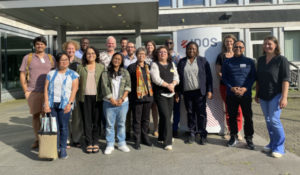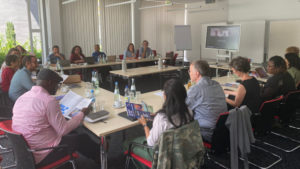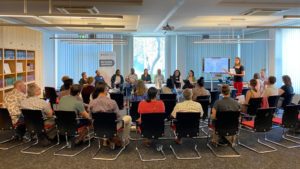IDOS and the University of Bonn organised a workshop on “Interlinking sustainability science in a Global North-South dialogue”. The participants stressed the importance of international collaboration, environmental justice and democratic structures for strengthening sustainable development.

Sustainability research seeks solutions to complex socio-ecological problems through an explicitly inter- and transdisciplinary approach. However, it focusses mainly on the Global North. The workshop from 15 to 18 July 2024, hosted by IDOS and co-organised with the Bonn Research Alliance (BORA), the Department of Southeast Asian Studies, and the Center of Development Research (ZEF) of the University of Bonn, addressed this issue. It brought together an interdisciplinary group of scholars from Bolivia, Colombia, Ghana, Germany and Indonesia to facilitate dialog on different conceptualisations of sustainability and sustainability science across continents. Participants identified commonalities and differences between local, regional and global notions of sustainability and assessed the global and transformative potential of concepts of African and Latin American philosophy such as Buen Vivir and Ubuntu.
Moreover, the participants discussed challenges and ways to strengthen inter- and transdisciplinary cooperation across continents. The participants identified rigid disciplinary structures of research donors in Europe as well as a lack of funding for social science research on sustainable development in the South as main challenges for eye-level cooperation among scholars based in different world regions.

The workshop closed with a round table discussion, which was jointly organised with the working group ‘Alternative Sustainabilities’ funded by the German Committee Future Earth. The discussion was moderated by Dr Sandra Gilgan (BORA) and Prof. Kristina Großmann (Uni Bonn) and involved Dr Suraya Afiff (University of Indonesia, Depok, Indonesia), Dr Constance Akurugu (University of Business and Integrated Development Studies, Wa, Ghana), Dr Estela Herbas (Bolivian Catholic University, Cochabamba, Bolivia), Dr Stephen Nkansah Morgan (College of Humanities, Accra, Ghana), Prof. Mangku Purnomo (Brawijaya University, Malang, Indonesia), Dr Fernanda Wanderley (Bolivian Catholic University, La Paz, Bolivia), Jun-Prof. Lisa Biber-Freudenberger (University of Bonn, Center for Development Research ZEF) and Dr Jonas Hein (IDOS). The participants emerged the call to “do sustainabilities differently”, work with communitarian approaches and change the relationship between humans and non-humans.

The workshop was funded by the TRA 4 “Individuals, Institutions and Societies” (University of Bonn) as part of the Excellence Strategy of the federal and state governments and by the German Committee Future Earth. The roundtable was funded by the German Committee Future Earth and the Staff Unit for BORA.

Schreibe einen Kommentar